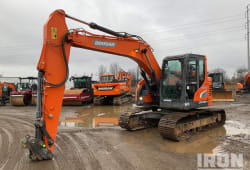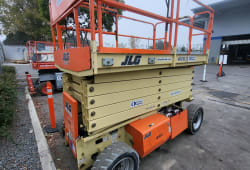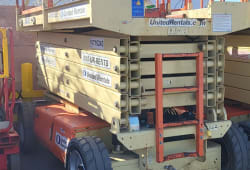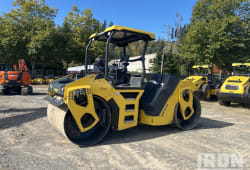Effective Fleet Management: Optimizing Heavy Equipment Performance
13 Min read
)
August 11, 2023
Fleets of heavy equipment play a crucial role in industries like construction, mining, and transportation. Ensuring their optimal performance is of utmost importance to maximize productivity and minimize downtime. This article explores the key elements of effective fleet management and strategies to optimize heavy equipment performance.
Understanding the Importance of Fleet Management
Before delving into the specifics of effective fleet management, it is essential to understand what fleet management entails. Fleet management refers to the comprehensive coordination and supervision of a company's vehicles and heavy equipment.
When it comes to heavy equipment operations, fleet management takes on an even more critical role. It involves overseeing the maintenance, scheduling, safety, and overall performance of the equipment to ensure smooth operations and minimize costly breakdowns.
Defining Fleet Management
Fleet management is the process of managing and controlling a fleet of vehicles and heavy equipment assets. It encompasses various aspects, including acquisition, maintenance, fuel management, driver/operator management, and compliance with safety regulations.
The acquisition is a crucial component of fleet management. It involves carefully selecting the right vehicles and heavy equipment that meet the organization's operational requirements. Fleet managers consider factors such as load capacity, fuel efficiency, durability, and compatibility with existing infrastructure.
Maintenance is another key aspect of fleet management. Regular inspections, servicing, and repairs are necessary to keep the vehicles and heavy equipment in optimal condition. Fleet managers develop maintenance schedules, perform routine checks, and address any issues promptly to prevent breakdowns and ensure maximum uptime.
Fuel management is an essential consideration in fleet management. Fleet managers monitor fuel consumption, implement fuel efficiency strategies, and track fuel expenses. They may explore alternative fuel options, such as biodiesel or electric vehicles, to reduce environmental impact and lower operating costs.
Driver/operator management is crucial for efficient fleet operations. Fleet managers hire and train qualified drivers/operators, ensuring they possess the necessary licenses and certifications. They establish clear guidelines for safe driving practices and enforce compliance with traffic regulations and company policies. Regular performance evaluations and training programs help improve driver/operator skills and promote a culture of safety.
Compliance with safety regulations is a top priority in fleet management. Fleet managers stay updated with local, state, and federal regulations related to vehicle and heavy equipment operations. They ensure that all vehicles and equipment meet safety standards, conduct regular safety inspections, and provide appropriate safety equipment and training to employees.
The Role of Fleet Management in Heavy Equipment Operations
In the context of heavy equipment operations, effective fleet management is vital to ensure the smooth functioning of projects. Fleet managers are responsible for keeping equipment in peak condition, minimizing downtime, and maximizing utilization to meet project deadlines and deliver superior results.
One of the primary responsibilities of fleet managers is to develop comprehensive maintenance programs for heavy equipment. They establish regular inspection schedules, perform preventive maintenance tasks, and promptly address any equipment malfunctions or failures. By prioritizing maintenance, fleet managers can minimize unexpected breakdowns and costly repairs, ensuring that projects stay on track.
Efficient scheduling is another critical aspect of fleet management in heavy equipment operations. Fleet managers coordinate equipment allocation based on project requirements, ensuring that the right equipment is available at the right time. They consider factors such as equipment availability, project timelines, and transportation logistics to optimize equipment utilization and minimize idle time.
Effective fleet management also involves monitoring equipment performance and usage. Fleet managers utilize advanced tracking systems and telematics technology to gather data on equipment usage, fuel consumption, and maintenance needs. This data helps identify trends, optimize equipment utilization, and make informed decisions regarding equipment upgrades or replacements.
By implementing proper fleet management practices, organizations can significantly improve operational efficiency, reduce costs, enhance safety, and extend the lifecycle of their heavy equipment assets. Fleet managers play a crucial role in ensuring the seamless integration of vehicles and heavy equipment into the organization's operations, ultimately contributing to its overall success.
Key Elements of Effective Fleet Management
Several key elements are crucial for successful fleet management, particularly when it comes to optimizing heavy equipment performance.
Effective fleet management involves more than just overseeing the operation of a fleet of vehicles or heavy equipment. It requires careful planning, coordination, and implementation of various strategies to ensure smooth operations, minimize downtime, and maximize productivity. Let's take a closer look at some key elements that contribute to effective fleet management.
Regular Maintenance and Inspection
Maintaining heavy equipment is essential to prevent unexpected breakdowns and costly repairs. Regular inspections and preventive maintenance should be conducted to identify and address any potential issues before they escalate.
Fleet managers need to establish a comprehensive maintenance schedule, including routine inspections, lubrication, filter replacements, and component checks. By prioritizing maintenance, organizations can prolong the lifespan of their equipment, minimize downtime, and maximize productivity.
Moreover, implementing a robust maintenance management system can help track maintenance activities, monitor equipment performance, and ensure timely servicing. This data-driven approach enables fleet managers to make informed decisions regarding equipment maintenance and replacement, further optimizing fleet operations.
Efficient Fleet Scheduling
Proper fleet scheduling is crucial for achieving optimal equipment utilization. Fleet managers must carefully plan and coordinate the usage of heavy equipment to ensure that the right equipment is in the right place at the right time.
This involves effective communication with project managers, determining equipment availability, and considering factors such as weather conditions and project requirements. By streamlining fleet scheduling, organizations can minimize idle equipment time, increase productivity, and reduce operational costs.
Advanced fleet management software can provide real-time visibility into equipment availability, location, and utilization. This technology empowers fleet managers to make data-driven decisions, optimize routes, and allocate resources efficiently. Additionally, integrating telematics systems can provide valuable insights into fuel consumption, driver behavior, and equipment performance, enabling proactive measures to enhance fleet efficiency.
Implementing Safety Measures
Safety should be a top priority in any fleet management strategy, especially when dealing with heavy equipment. Fleet managers must establish and enforce strict safety protocols to protect operators, other workers, and the equipment itself.
This includes providing proper operator training, ensuring compliance with safety regulations, performing regular safety inspections, and promoting a safety-oriented culture. By prioritizing safety, organizations can prevent accidents, minimize injuries, and maintain equipment in optimal condition.
Furthermore, integrating safety technologies, such as collision avoidance systems, backup cameras, and fatigue monitoring devices, can enhance safety measures and reduce the risk of accidents. These technologies provide real-time alerts and warnings, helping operators and fleet managers mitigate potential hazards.
Additionally, conducting regular safety training sessions and toolbox talks can reinforce safety awareness among operators and create a culture of continuous improvement. By regularly reviewing safety procedures and addressing any identified risks, fleet managers can ensure that safety remains a fundamental aspect of their fleet management strategy.
In conclusion, effective fleet management requires a holistic approach that encompasses regular maintenance and inspection, efficient fleet scheduling, and the implementation of safety measures. By prioritizing these key elements, organizations can optimize heavy equipment performance, minimize downtime, and maximize productivity.
The Impact of Technology on Fleet Management
In recent years, technology has revolutionized fleet management practices, bringing unprecedented efficiency and transparency to heavy equipment operations.
With the advent of new technologies, fleet managers now have access to a wide range of tools and systems that enable them to streamline their operations and maximize productivity. These technologies have not only made fleet management more efficient but also more cost-effective.
One of the key technological advancements in fleet management is telematics. Telematics, a combination of telecommunications and informatics, has emerged as a game-changer in fleet management. By utilizing GPS tracking, sensors, and data analytics, telematics enables real-time monitoring and control of heavy equipment.
The Role of Telematics in Fleet Management
Telematics has transformed the way fleet managers monitor and manage their assets. With the help of GPS tracking, fleet managers can now keep track of their equipment's location at all times. This allows for better coordination and scheduling of operations, reducing delays and optimizing resource allocation.
In addition to location tracking, telematics also provides valuable insights into fuel consumption. By monitoring fuel levels and analyzing data, fleet managers can identify inefficiencies and implement strategies to reduce fuel costs. This not only saves money but also helps in reducing the environmental impact of fleet operations.
Furthermore, telematics enables fleet managers to monitor engine health and performance in real time. By analyzing data on engine diagnostics, fleet managers can identify potential issues before they escalate into major problems. This proactive approach to maintenance helps in minimizing downtime and maximizing equipment lifespan.
Benefits of GPS Tracking for Heavy Equipment
GPS tracking systems have become an integral part of fleet management, providing crucial data for optimizing heavy equipment performance. By accurately tracking equipment location and maintenance needs, GPS technology enables fleet managers to effectively manage their assets.
One of the key benefits of GPS tracking is route optimization. By analyzing data on traffic patterns, road conditions, and historical data, fleet managers can identify the most efficient routes for their equipment. This not only reduces fuel costs but also minimizes wear and tear on the equipment.
In addition, GPS tracking helps in preventing unauthorized equipment use. By setting up geofences and alerts, fleet managers can ensure that their equipment stays within designated areas. This helps in reducing the risk of theft and unauthorized usage, ultimately saving money and enhancing the security of valuable assets.
Moreover, GPS tracking systems aid in recovering stolen equipment. In the unfortunate event of theft, fleet managers can quickly locate their equipment and coordinate with law enforcement agencies for its recovery. This not only minimizes financial losses but also acts as a deterrent for potential thieves.
Predictive Maintenance with IoT
The Internet of Things (IoT) has paved the way for predictive maintenance in fleet management. By connecting heavy equipment to the internet and gathering real-time data, fleet managers can predict equipment failures before they happen.
IoT-enabled sensors monitor various aspects of equipment, such as temperature, vibrations, and fluid levels. This data is analyzed to identify patterns and anomalies, allowing for proactive maintenance and minimizing unplanned downtime.
Predictive maintenance not only saves money by reducing the cost of reactive repairs but also improves overall equipment reliability. By addressing potential issues before they escalate, fleet managers can ensure that their equipment operates at peak performance, minimizing disruptions to operations.
Furthermore, IoT-enabled sensors also help in optimizing maintenance schedules. By analyzing data on equipment usage and performance, fleet managers can determine the optimal time for maintenance activities. This helps in minimizing downtime and maximize equipment availability, ultimately improving fleet performance.
Strategies for Optimizing Heavy Equipment Performance
Besides effective fleet management, certain strategies can enhance heavy equipment performance and maximize project outcomes.
Heavy equipment plays a crucial role in construction, mining, and other industries that require the use of powerful machinery. To ensure that these machines perform at their best, organizations can implement various strategies that focus on operator training, performance monitoring, and equipment upgrades.
Proper Operator Training
Well-trained operators play a crucial role in maximizing heavy equipment performance. Comprehensive training programs ensure that operators are knowledgeable about equipment functions, safety protocols, and best practices.
Operators must understand the intricacies of the equipment they operate to avoid errors that could lead to accidents or damage. By investing in training, organizations can minimize operator errors, reduce equipment wear and tear, and enhance overall productivity.
Training programs can cover a wide range of topics, including equipment operation techniques, maintenance procedures, and safety guidelines. By providing operators with the necessary knowledge and skills, organizations can improve heavy equipment performance and ensure the safety of their workforce.
Implementing Performance Monitoring
Performance monitoring systems help fleet managers track and measure various performance metrics, such as fuel consumption, engine efficiency, and equipment utilization.
By regularly monitoring these metrics, fleet managers can identify opportunities for improvement, detect inefficiencies, and implement corrective measures to optimize heavy equipment performance. For example, if a particular machine is consuming excessive fuel, it may indicate a need for maintenance or operator training to improve fuel efficiency.
Performance monitoring also enables organizations to identify trends and patterns in equipment performance over time. This data can be used to develop predictive maintenance strategies, ensuring that equipment is serviced before major issues arise, minimizing downtime, and maximizing productivity.
The Importance of Equipment Upgrades
Regularly upgrading equipment is a critical strategy to stay competitive in the heavy equipment industry. Newer models often offer improved efficiency, better fuel economy, advanced technology integration, and enhanced safety features.
Advancements in technology have led to the development of heavy equipment with features such as GPS tracking, telematics systems, and automated controls. These technologies not only improve efficiency but also enable better asset management and preventive maintenance.
Fleet managers need to consider factors such as equipment age, maintenance costs, and advancements in technology to determine when equipment upgrades are necessary. Upgrading equipment ensures that a fleet remains competitive, increases productivity, and adapts to changing industry requirements.
Furthermore, newer equipment models often comply with stricter environmental regulations, reducing emissions and minimizing the impact on the environment.
Overall, by focusing on proper operator training, implementing performance monitoring systems, and considering equipment upgrades, organizations can optimize heavy equipment performance, improve project outcomes, and maintain a competitive edge in the industry.
Case Studies of Successful Fleet Management
Case Study 1: Improving Efficiency with Fleet Management
In a construction company, implementing effective fleet management practices led to significant improvements in operational efficiency. By regularly maintaining heavy equipment, optimizing fleet scheduling, and promoting safety awareness, the company reduced downtime and increased equipment utilization.
As a result, project timelines were met more efficiently, costs were minimized, and client satisfaction improved. Effective communication, accurate data analysis, and proactive decision-making were instrumental in achieving these outcomes.
Case Study 2: Reducing Costs through Optimized Performance
A mining company achieved substantial cost savings by leveraging fleet management strategies. By utilizing telematics and GPS tracking systems, fleet managers accurately monitored heavy equipment performance, fuel consumption, and maintenance needs.
Integrating predictive maintenance practices helped in addressing issues before they led to expensive breakdowns. This proactive approach significantly reduced maintenance costs, minimized equipment downtime, and improved overall operating efficiency.
Future Trends in Fleet Management
The Rise of Autonomous Heavy Equipment
Autonomous heavy equipment, guided by artificial intelligence and advanced sensors, is poised to revolutionize fleet management in the coming years. These intelligent machines can operate without human intervention, improving safety, efficiency, and productivity.
With autonomous equipment, fleet managers can optimize fleet scheduling further, reduce labor costs, and enhance equipment utilization. However, proper regulations, training, and infrastructure will be necessary to harness the full potential of this emerging technology.
The Impact of Green Initiatives on Fleet Management
As sustainability becomes increasingly important, fleet management will also be impacted by green initiatives. Organizations will focus on reducing carbon emissions, improving fuel efficiency, and exploring alternative energy sources.
Transitioning to electric or hybrid heavy equipment, implementing eco-friendly practices, and using renewable energy for charging infrastructure will shape the future of fleet management. These initiatives will not only reduce environmental impact but also enhance cost-effectiveness in the long run.
Conclusion
Effective fleet management plays a crucial role in optimizing heavy equipment performance. By understanding the key elements of fleet management, integrating technological advancements, and implementing strategies like proper maintenance, efficient scheduling, and safety measures, organizations can achieve superior results.
Furthermore, case studies prove the tangible benefits of effective fleet management, such as improved efficiency and reduced costs.
Looking ahead, the rise of autonomous equipment and the impact of green initiatives will shape the future of fleet management, bringing forth exciting possibilities for even greater productivity and sustainability in heavy equipment operations.















